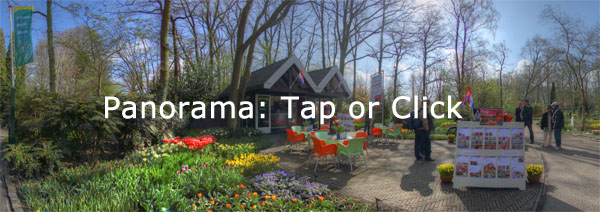A Chicago “L” station is about the last place you would think of to pick up a carton of milk.
But online grocer Peapod has turned a busy CTA station at State and Lake streets into a virtual supermarket aisle, enabling commuters to use their smartphones to scan and buy any of 70 items.
Appearing overnight on once-barren walls, 7-foot-tall virtual shelves line both sides of a 60-foot tunnel, filled with everything from paper towels and diapers to fresh produce. Android and iPhone users can download a free Peapod mobile app to load up their electronic grocery carts for delivery the next day.
Chicago, Peapod’s largest market, is the second U.S. city to roll out the interactive supermarket shelves, which first appeared last month at Philadelphia train stations. Other Chicago locations might be added, as well as locations in other cities, depending on what happens during a 12-week run at the station, which averages 17,640 commuters each weekday.
Morning Panorama @ Keukenhof 2012
Strategic Air Command Museum: Entrance Panorama with SR-71 Blackbird

Tap (iPhone, iPad, Android) or click (mac/pc) to view this entrance panorama. Place your finger or mouse inside the scene and pan in any direction. Pinch to zoom in or out.
www.sacmuseum.org/
Money, Power & Wall Street
New York City’s Hidden Subway Station
Deep in the belly of New York’s subway system, a beautiful untouched station resides that has been forgotten for years with only a limited few knowing of its existence. Stunning decoration with tall tiled arches, brass fixtures and skylights run across the entire curve of the station, almost a miniature imitation of Grand Central Station… But it sounds like something straight out of Harry Potter, right?
Two brilliant moves that helped create the Apple iOS powerhouse
Most new announcements by Apple are digested and understood by the tech press instantaneously. Great products are great products, and it doesn’t take much time to realize how exciting things like the iPad or Retina displays are. But some moves can take years to completely understand.
So, I now bring you, my two favorite tactical moves by Apple, which I have only recently come to fully appreciate.
Why Nurses Need More Authority
Think it takes a long time to get an appointment with a primary care provider now? Brace yourself: it will likely only get worse. We’re facing a severe shortage of primary care physicians in the nation. The Association of American Medical Colleges predicts a shortfall of 29,800 primary care physicians by 2015, and 65,800 by 2025, mainly because of the anticipated increase in demand for services from the Affordable Care Act (ACA), deterrents to entering the field, such as relatively lower incomes, and growth in the general population and specifically growth in the elderly population. Should the ACA pass muster with the Supreme Court next month, an additional 30 to 33 million previously uninsured Americans will be covered — and even if ACA is not implemented in full, and in the end merely expands Medicaid, it will add 17 million to the insured ranks by 2020.
One of the best ways to alleviate this shortage is to expand the scope of practice for advanced practice registered nurses (APRNs), well-trained registered nurses with specialized qualifications who can make diagnoses, order tests and referrals, and write prescriptions. APRNs could provide a variety of services that primary care physicians now provide.
Lessons from Twenty Years of the Kauffman Foundation’s Investments in Venture Capital Funds and The Triumph of Hope over Experience
Venture capital (VC) has delivered poor returns for more than a decade. VC returns haven’t significantly outperformed the public market since the late 1990s, and, since 1997, less cash has been returned to investors than has been invested in VC. Speculation among industry insiders is that the VC model is broken, despite occasional high-profile successes like Groupon, Zynga, LinkedIn, and Facebook in recent years.
The Kauffman Foundation investment team analyzed our twenty-year history of venture investing experience in nearly 100 VC funds with some of the most notable and exclusive partnership “brands” and concluded that the Limited Partner (LP) investment model is broken 1 Limited Partners—foundations, endowments, and state pension fund—invest too much capital in underperforming venture capital funds on frequently mis-aligned terms. Our research suggests that investors like us succumb time and again to narrative fallacies, a well-studied behavioral finance bias. We found in our own portfolio that:
Google’s problem is that it now believes itself above others – even governments
It’s never the offence; it’s the cover-up. And if there’s one thing that the last few years have taught us, it’s that the suggestion of a “rogue” worker having acted alone to do something which led to an intrusion is never correct. There has to be a failure of management oversight as well.
That’s why Google is in such hot water now over the revelations contained in the Federal Communications Commission (FCC) report into what went wrong with its Street View Wi-Fi data collection program.
Here’s what the FCC said: the engineer who wrote the code to capture the data told his managers about it. He told his colleagues about it. He wrote the code in his “20% time” – the “spare” time that Google allows staff to do projects that interest them – and it was then incorporated into the code used on the Google Street View cars which drove around the public byways of the world, capturing pictures … and also data from open Wi-Fi networks.
Google’s Poor & Defiant Settlement Record
Google’s poor and defiant track record in respecting government agreements and settlements is likely one of the reasons the FTC hired an undefeated former Federal prosecutor and litigator to lead their Google antitrust probe and potential litigation against Google. The EU and the FTC are naturally exceptionally skeptical about negotiating an antitrust settlement with Google, given the substantial evidence that shows Google is consistently less-than-trustworthy in abiding by its agreements with Governments.
Specifically, the evidence shows that Google has not abided by either of its privacy agreements with the FTC concerning Street-View WiSpy or Google-Buzz, nor has Google fully-abided by its criminal Non-Prosecution-Agreement with the DOJ concerning its advertising of illegal prescription drug imports. In addition, Google attempted to broadly game the justice system in negotiating a Google Book Settlement that would have rewarded it with a partial monopoly for its mass copyright infringement.
